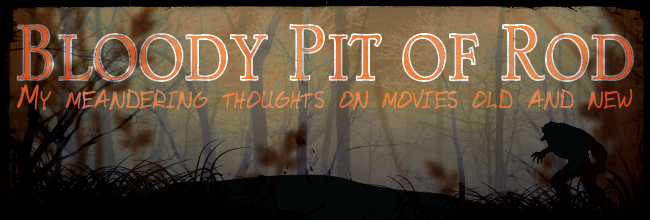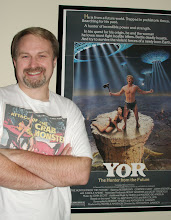Over the last twenty-five years serious fans of horror and
science fiction cinema have been happy to witness the awakening of book
publishers to the idea that there is more to talk about than the monster
make-up and special effects that are the most obvious point of interest in
these films. It has always been difficult for those fascinated by genre films
to convince mainstream film aficionados of the deeper, more thoughtful aspects
of these movies because of the surface elements that attract the most obvious widespread
attention. Because of this prejudice the long road to the publication of
serious intellectual works focused on horror films almost had to start with
movies that have stood the test of decades of popular acclaim and were slowly, grudgingly
accepted as good cinema. Those first steps were books of deep discussions of
films with literary roots such as Dracula and Frankenstein and movies with
often tenuous links to Edgar Allan Poe. When those books proved successful the
doors cracked open and, aided by several foreign press' similarly delving into
the cult film world for new subject matter, more attention began to be paid to
the high quality (and even low quality) works of horror. We are now at a point
where someone interested in horror film studies doesn't have to rely on one or
two reference books in a certain field but might actually find themselves in
the position of having so many choices it becomes difficult to know where to
start. Of course, this is a problem I'm glad to have even if it complicates my
desire to learn more about the movies I love.
But one area of cinema interest has been, until now, mostly neglected
by film academics and that would be the monster and horror films of Spain . In the United States much attention has been paid to the
various Spanish language genre films of Mexico
but Spain
has suffered in the dark. This might be because of the shared border that makes
it easier to import scratchy VHS and DVD copies or the colorful nature of the
Masked Wrestling films of El Santo and his cohorts or the fact that K. Gordon
Murray ran dubbed Mexican genre movies through kiddie matinees like a madman who
had learned there was gold in them there theaters! But it is probably also
because, for American viewers, it can be difficult to distinguish a Spanish
made horror film from one of Italian origin since they were all dubbed and
often by the same voices. A casual fan might never notice the differences
inherent in these films or even realize that these differences depend upon
their country of origin. Those who are really interested do begin to pick up on
the ways in which Spanish horror efforts are distinct from their European
brethren and luckily we now have a book that can serve as an intelligent
conversation starter.
Sex, Sadism ,
Spain Spain grow into a prosperous
nation. These are the conditions and history that Schlegel points to as the
creative seedbed that made the best of the country's hundreds of horror films distinctly Spanish.
In the largest, most fascinating sections of this book he uses several specific
movies as examples of this. Dividing them into productions co-financed with
money from other counties and then the completely homegrown films Schlegel describe
the details that mark each as a specific product of Spain . It is in these chapters that
genre fans will find much intellectual meat to tear into.
As a Paul Naschy fan I was immensely curious to see what the
author would find in his werewolf and other monster efforts and I was not
disappointed. When discussing one of Naschy's most famous films Walpugis Night
(a.k.a. Werewolf Shadow a.k.a. The Werewolf vs. the Vampire Woman) he notices that Naschy's screenplay has
structured the movie monster's psyches along the lines of the classic Freudian
formulation of the id, ego and superego. As I read Schlegel's detailed analysis
of the creature's driving desires with this framework I was shocked to see
exactly what he meant. The vampires are pure id always seeking pleasure
regardless of costs while the tortured werewolf wants only to end his eternal existence
because he kills aligning the ego and superego within his bifurcated body.
Using this view to examine the rest of the tale opens up whole new avenues that
makes thinking seriously about these movies fascinating.
Another amazing discussion is Schlegel's dissection of one
of the best and best known Spanish horror films Horror Express (1972). Earlier
in the book he pointed out that while American filmmakers had thirty years to
refine their craft to the moment that they produced something as monumental in
the genre as Hitchcock's Psycho (1960) Spanish creators had to absorb those
lessons in a brief few years and synthesize them in order to compete. That they
succeeded so well is a testament to their talent and skill with Eugenio
Martin's astonishing film standing as the perfect example of transmutation
within the confines of chosen set of limits. Part science fiction, part murder
mystery, part period adventure and part EC comics horror this film - according
to Schlegel - also serves as a view inside the Franco dictatorship from a
Spanish citizen's restricted perspective. Indeed, he poses the bold claim that
its not an alien monster that stalks the Trans-Siberian train but history
itself that moves throughout the narrative. This is an amazing reading of the
film's narrative that, at first I was surprised by, but eventually the author
won me over with the force of his argument and some pointed quotes from director
Martin. And even if this view of Horror Express doesn't jib with your own, the
idea itself is fascinating regardless of authorial intent.
This is exactly the kind of film commentary book I love to
read! The films examined are accepted as works of quality within their field
and worthy of study because of that fact. The intentions of the filmmakers is
explored, the times of the production are probed, the concepts presented are
teased apart for relevance while the whole is enjoyed as an entertaining work. Nicholas
Schlegel has written a fine work delving into an area filled with untapped
potential for study. Fans of Spanish horror are lucky that someone has finally
begun to explore the deeper aspects of this neglected field and doubly lucky
that someone with writing talent has taken the first step. The fear that a book
of this type might be dull or dry is one of which I can happily disabuse you.
This is a book written by a man who is first and foremost a fan of these movies
but has applied his academic mindset to a beloved sub-genre. I hope that he
eventually explores these field further in a second volume and continues to
burnish the Golden Age of Spanish Horror to a high sheen.













1 comment:
Thanks for the write-up on this Rod. I'm a huge Spanish horror fan and have been curious about this (even though I'd pretty much decided to buy it). Thanks much for the nudge.
Post a Comment